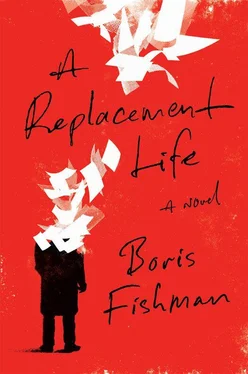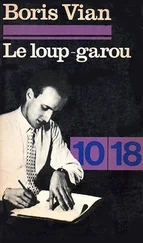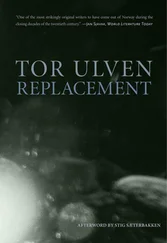“Exquisite magnanimity.”
“Slava, I’m on your side.”
“Why do you call your parents by their first names?”
“I don’t know, that’s how it’s always been. I don’t always.”
“Your father bent the rules himself — he got a special favor from the registrar.”
“Are you really going to compare?” she said. “It was for a good cause.”
“Who gets to decide what’s a good cause? You said it: a thirty-year dispensation. Let the savages lie a bit to the Germans.”
She placed her palm on his forearm. “ You can’t.”
“You’re full of instructions.”
She turned away.
“I’m sorry,” he said. “This isn’t me. This is—”
“I know.”
She knew. There was nothing he could say that she didn’t already know. His irritation wouldn’t abate, but he forced himself to ignore it. “Are your grandparents still alive?” he said.
“Just my grandmother,” she indulged his effort. “Ninety-four young. Swims every morning, e-mails Zen declarations.”
“For instance.”
She brightened. “‘Hi my doll Ari.’ That’s what she calls me. ‘I am finally too old to give a crap what anyone thinks. I wish I’d gotten here fifty years sooner.’ And then the next day, ‘Ari, doll, do you think a ninety-four-year-old woman can’t shake her hips? Yes, she can.’ My grandfather’s gone, all her friends are gone, and all of a sudden she likes a sip of Maker’s and then to the jukebox. Do you know that poem: ‘On the way we passed a long row of elms. She looked at them awhile out of the ambulance window and said, What are all those fuzzy-looking things out there? Trees? Well, I’m tired of them and rolled her head away.’ My God, I am just rambling.”
“Did you cover the mirror when your grandfather died?”
She shrugged. “I was five. I had a dance recital that weekend, so I was doing pirouettes like a loon. I was so sad all the mirrors were covered. I’m named after his father. Ariel. You?”
“I don’t know,” Slava said. “Slava means ‘glory.’ Or ‘fame.’ Depending on what you mean. I covered a mirror. I didn’t feel anything.”
“It’s like weed — you don’t feel anything the first couple of times,” she laughed, ushering stridency out of the conversation. This time he went along. “A shiva lasts for a week,” she went on. “You keep the mirrors covered. Then you see what you feel.”
“I see,” he said.
“Or not,” she said. “You take on too much, so it’s too much, and then you want none of it. You’d rather do nothing than have to do all that . But you can choose your own amount.”
“I would like to teach you something as well,” he said.
“Please,” she said.
“I meant I also would like to find something to teach you.”
“I wouldn’t be here if I didn’t think you could.”
“You’re just doing a favor for a colleague.”
“If you think so, Slava, you’re not as smart as I hoped. But finally, yes, I dragged you out. It was easier to get hired by Century .”
A slurry smile appeared on his face. “The upside of professional mortification. Why me?”
“You’re not like the others.”
“That’s a foolproof fact.”
“What do you want, Slava?” she said. “You want to publish in Century so badly?”
“I guess not,” he said. “I remember the first time I saw it. I was just killing time in the library. A lot of time killing time in the library at Hunter. I’d gone through half the magazines in the periodical rack. And then Century . There was a piece about a rape in South Africa, and Sheila”—Sheila Garbanes (pert, tart, groovy) was a staff writer—“had a piece on these two philosophers at the University of Chicago. Ask me if I knew the first thing about philosophy, but I read the whole thing.”
“God, I read the same issue,” she said.
“Arch—”
“On the farmers. The father farms organic and the son farms industrial,” she said. “Imagine if we were reading it at the same time, fifty blocks apart.”
“I want to write something people will read,” he said. “And say, There goes the fellow who wrote that.”
“So do that,” she said. “Wake up tomorrow and write something new. And send it somewhere else. Not Century . Some other place. Are you listening? Look at me.”
“I will,” he said, straightening.
“And another thing,” she said. “You don’t think about this anymore between now and then. It can’t help you.”
“Okay,” he said.
“And then the third thing.”
“Yes.” He tried to focus the glaze out of his eyes.
“Take me home.”
In the taxi, he ripped the sleeve of the Balenciaga from her shoulder. He sprang back, remembering Skinny Jeans’s valuation, but she shrugged it away. Her tongue was cool and thick, her breath smoky and clean despite everything they had been drinking. They bit each other’s lips, breathing each other in. He imagined the air spread to every corner of her, down to the dead fingertip, where it stopped.
At the wheel, Hamid Abdul was trying not to watch them. Hamid, his immigrant brother. How Slava was exceeding his immigrant brief with this fine-skinned American specimen. See Slava take the milk of this American skin into his mouth, Hamid. Look at her fingers disappear from your rearview mirror. We are miscegenating with the natives, Hamid, we are assimilating, are we not?
Irvin the doorman did not share Hamid’s interest in Slava’s quarry. He wanted only Slava’s “John Handcocks” for a pair of slacks from dry cleaning. Slava told him that he was going to buy some skinny jeans and be done with this slacks business. “It is absolute,” Irvin nodded obediently.
“What a funny blanket,” Arianna said when they got into the apartment, eyeing the rhombus-shaped opening of the duvet cover. Slava stopped in the doorway to the bathroom. “It’s old,” he said before heading inside.
When he emerged, she was asleep on his clean sheets in her street clothes, the knobs of her knees frowning behind the fabric. He shed the lights, leaving only the desk lamp that had craned above so many drafts. Arianna slept guilelessly, her unnerving alertness finally stilled. He wondered what his grandmother had looked like at the moment she’d drawn her last breath. Had she been aware of it or lost in delirium? Had she been in pain or the opposite of pain? Was she talking now with her dead mother and father and grandfather? Hello, after all this time. It’s you. Where to begin? Let me tell you about everyone who showed up after you left: Zhenya, and the dance hall, and Zhenya, and prison, and Zhenya, and Tanya, and Edik, and tiny Slava, and Crimea, and the car accident, and then America, but first Italy, those fat grapes, the sea — I never learned how to swim! — and then, yes, America… He stopped himself. Her memories were his memories. But what were her memories?
He sat staring at the telephone for a long time. It was late, too late to call, but he lifted the cordless anyway, stepping into the bathroom to avoid waking Arianna. Sure, Arianna, he would write something else.
“What’s wrong?” Grandfather said. “What happened?”
“I’m sorry to call so late. You were asleep?”
“What is it?”
“Tell me about Grandmother in the ghetto,” Slava said.
Grandfather was silent, trying to understand. “I don’t know,” he said. “Why are you asking?”
“You wanted me to do something. So I’m asking about her.”
“Oh,” Grandfather said, startled. “But it would be about me.”
“I can’t very well write about what Uzbekistan was like. Think.”
“Oh,” Grandfather said. “I get it. She didn’t like to talk about it.”
Читать дальше











